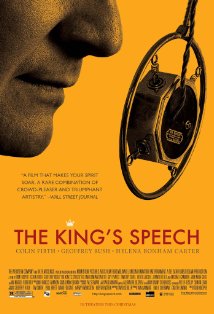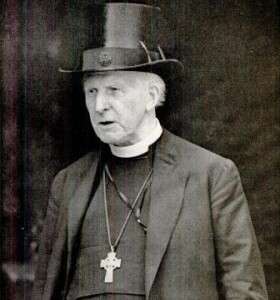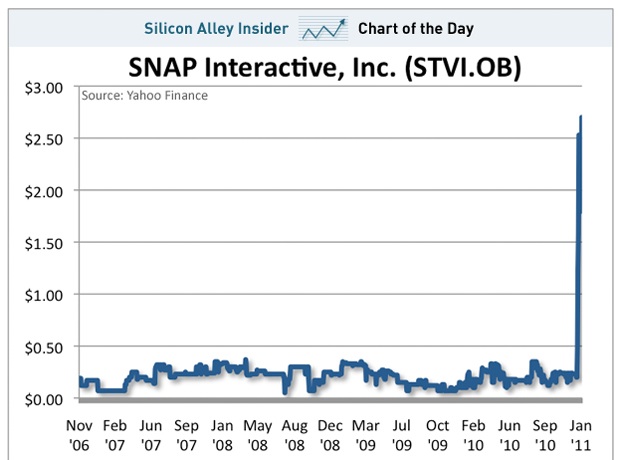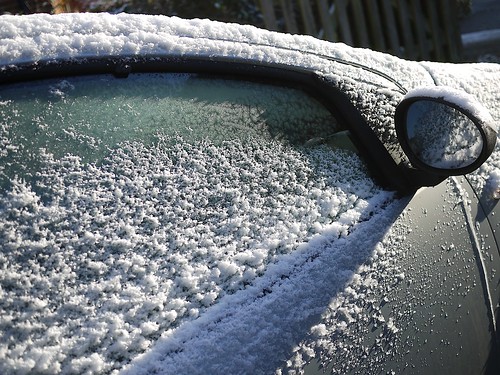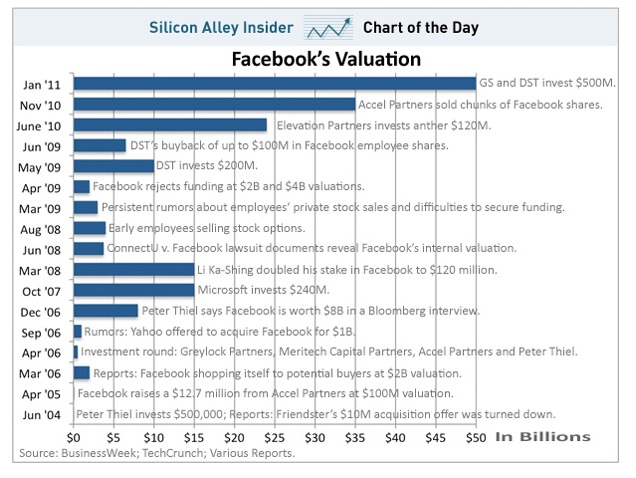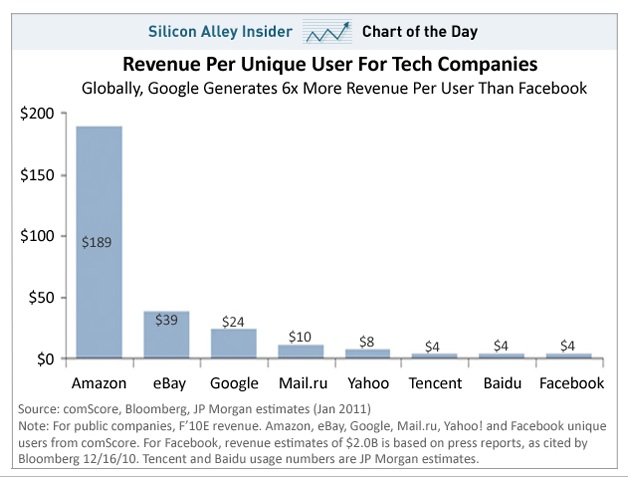Just stumbled on a delightful site — Bookshelf Porn — via a tweet. Not at all what you’d expect from the name. Just a glimpse of the infinitely-varied ways people have of storing their books. It’s truly amazing what one finds on the Web.
The King’s Speech
We went to see The King’s Speech last night. I thought it was terrific — beautifully acted, cleverly written and surprisingly moving. Colin Firth gives a great performance as the stammering monarch-to-be but what really blew me away was Geoffrey Rush’s rendition of Lionel Logue, the speech therapist who gave him his voice. (Helena Bonham-Carter is also good as Elizabeth Bowes-Lyon, but her performance isn’t in the same league as that of the two men.)
One small, cavilling point. The film claims to be based on a true story — of how a rough Antipodean diamond of a speech therapist enabled a shy stammerer to carry out his public duties. But Derek Jacobi portrays Archbishop Cosmo Lang — who played such a pivotal role in the Abdication crisis — as an odious little creep. I’m perfectly prepared to accept that senior prelates can be odious creeps (as a former Irish Catholic I could give you a long list of same), but Lang seems to have been a more complex character than Jacobi’s performance allows. For example, the Wikipedia entry on him claims that he denounced Mussolini’s invasion of Abyssinia and was outspoken about European anti-semitism. On the other hand, Wikipedia also claims that he supported the appeasement policies of the Baldwin and Chamberlain administrations.
The real Cosmo Lang.
Whatever else, Lang was right about the odious Edward VIII and his manipulative floozy (magnificently rendered in the film by Eve Best). A Life magazine profile of him published in 1939 records that in October 1936 he and the Archbishop of York “respectfully requested to be permitted to decline” a Royal invitation to a dinner at St. James’s palace at which Wallis Simpson was to be present. Later, Lang threatened to withhold communion from Edward if he married her. Eddie is reported to have retorted: “Please remember that I am the head of your organisation”. The magazine also goes on to reveal something startling: that on November 17, while the great British public was still completely in the dark about what was going on, Lang presided over a secret session of the House of Lords to discuss the crisis. (Hmmm… I wonder about that: surely the ‘speaker’ of the Lords at the time would have been the Lord Chancellor.)
The IMDB entry for the film notes one ‘goof’: in a scene set in 1934 Bertie (then still Duke of York) refers to “Marshal Stalin”. However, says IMDB, “Joseph Stalin was appointed Marshal of the Soviet Union almost 10 years later, in March 1943.”
The trailer for the film is here. Hope you enjoy it as much as we did.
On reflection… Another thought. Given that it’s supposed to be a true story, the film’s portrayal of Winston Churchill’s role in the Abdication crisis seems misleading. The impression is given that Churchill — played by a smouldering cigar ably brandished by Timothy Spall — was firmly behind Bertie and — by implication — implacably hostile to Eddie. But that wasn’t the case. For example, he and Lord Beaverbrook, the newspaper proprietor, were in favour of allowing the King to put his case (for being allowed to marry Wallis) to “the people” via a radio broadcast. This idea was blocked by the Cabinet, on the grounds that it would undermine the principle of a constitutional monarchy (which is that the only body entitled to decide these matters is Parliament).
The Facebook Gold(man) rush, contd.
More from Good Morning Silicon Valley.
Here’s a somewhat clearer look at how much money Facebook is making, according to the Wall Street Journal, which cites a 100-page document given to potential investors by Goldman Sachs: For the first nine months of 2010, the Palo Alto company’s revenue was $1.2 billion, its profit $355 million. And by the way, the same document shows that because it expects to surpass the legal threshold for number of private investors, Facebook will either have to go public or disclose financial information by April 2012, which excites Silicon Valley and others who have been waiting for the lackluster IPO market to make a triumphant return. The New York Times’ DealBook likens the interest surrounding the possible IPOs of Facebook and other social networking companies such as Twitter and Zynga to the dot-com boom of the 1990s.
This corrects a misapprehension of mine. I had thought that if a company went over 499 shareholders, then SEC rules would oblige it to float. But that’s not the case. It either has to float, or publish more detailed financial information.
The Internet of things
Facebook: the Gold(man) rush
It’s funny how people never learn. This useful report from Good Morning Silicon Valley brings back memories of the first Internet boom, and of the unscrupulous role that, ahem, major investment banks played in fuelling the lunacy. GMSV notes a WSJ article stating that Facebook’s 2009 profit was $200 million on revenue of $700 million, and goes on:
The New York Times’ DealBook reports today that Goldman Sachs Capital Partners, a $20.3 billion investment fund, was given first dibs at the Facebook investment but declined because of concern that the Palo Alto company’s $50 billion valuation is too high. The report also cited unnamed sources who say Facebook’s 2010 net income was $400 million on revenue of $2 billion. A Bloomberg report compares Facebook to Google: A $50 billion valuation is about 25 times the reported 2010 revenue, while Google’s price-to-sales ratio is estimated at 9. Another Facebook-Google comparison of note comes from Connie Loizos at peHUB: “When Google went public in 2004, it steered clear of sweetheart deal-making. … Deals like that of Facebook-Goldman reek of an old boys club way of doing business.”
Yep. Even if I had any money (which I don’t) and was minded to invest in tech stocks (which would be unethical, given my newspaper column) I wouldn’t ever touch a deal in which Goldman was involved. This, after all, is the bank that was recently fined for screwing its own clients. And now some of those saps are stampeding to get a ludicrously overpriced slice of the Facebook action. In ordinary life, they say that one sucker is born every minute. In the stock market, their birth rate seems to be considerably higher.
Later: It seems that the minimum investment Goldman requires for anyone who want to be involved in its Facebook fund is $2m. For disconsolate souls who don’t have that much money to lose, Silicon Valley Insider has this consoling news:
There’s a fun penny stock called Snap Interactive, whose fortune is tied to Facebook.
The company has the most popular dating app on Facebook and charges a small fee for some users. It’s managed to generate $2.7 million in revenue last quarter up from $1.7 million the quarter before.
That growth has gotten some investors attention, and now the stock price is soaring — its up over 1,000% in the last 30 days. So, if you want to roll the dice, and you want to play a Facebook company on the public markets, here’s your chance.
Er, their chart suggests that you may have missed even that boat.
This looks like a bubble to me, folks, with Goldman Sachs manning the airpump. The strategy seems clear: to stampede Facebook into a flotation by triggering the SEC rules that a company with more than 499 shareholders has to float.
In the interests of balance… I should point out that not everyone agrees with me that Facebook is over-valued at $50 billion.
Thumbs down for Steve
What to look out for in 2011
Interesting and thoughtful. Full list of the 100 on slide 9.
Remembering Tony Howard
The funeral of Tony Howard, the best and wisest political journalist of our time, is taking place today in London. I can’t be there but had been planning to attend his memorial service until I discovered that there won’t be one: he had explicitly insisted before he died that he should go unmemorialised. Which is not entirely surprising, because although he was outwardly the most plummy and ‘Establishment’ of figures, he was, deep down, the most unpompous of men who loved making mischief for the toffs of this world. One of my fondest memories is of being taken to lunch by him in a posh London restaurant in which he scandalised the toffee-nosed waiter by demanding tomato ketchup. A few moments later, with exaggerated and sarcastic elaboration, a small silver dish of ketchup was solemnly produced, and Tony delightedly slathered it all over his steak.
There was a nice item about him this morning on Radio 4’s Today which included an interview with my former Observer colleague, Robert Harris — once a political reporter, later a successful novelist. The interviewer mentioned the fact that in the days since Tony’s death a large number of established journalists had said that they owed their careers to Tony. Robert replied that he himself had also been one of that privileged band: Tony had lured him from BBC’s Panorama programme to become a political reporter on the Observer.
I was also one of the hacks who benefited greatly from Tony’s patronage. I first met him when I worked on the ‘Back End’ (i.e. literary section) of the New Statesman and he was Deputy Editor of the magazine. He provided me with one of my first glimpses of the British Establishment at work. I was in the office one morning in December when Roy Jenkins, then Deputy Leader of the Labour party and a former Home Secretary and Chancellor of the Exchequer, called in to hand in a book review that he had just written for the paper. (Pause for a moment to ponder this: can you imagine Harriet Harman — or George ‘Oik’ Osborne, come to that — being able to compose an elegant book review, and then trudge along to a newspaper office to hand it over in person?)
Just as Jenkins was leaving, Tony came up the stairs and (surprised) greeted him. My memory of the ensuing conversation runs like this:
Tony: “Oh, hello, Roy! I didn’t know you were coming in.”
Jenkins: “I just thought I’d drop in my piece.”
Tony: “We’re seeing one another tonight, aren’t we?”
Jenkins: (surprised) “Are we?”
Tony: “Yes. You’re coming to Victor’s birthday party, aren’t you?”
[Victor (V.S.) Pritchett was one of the New Statesman‘s most eminent contributors, and a well-known man of letters.]
Jenkins: “Oh, yes. I’m glad you reminded me.”
Tony: “Don’t you think it’s strange that Victor doesn’t have a K?”.
Jenkins: “Really? Doesn’t he?”
Tony: “No. It’s a disgrace.”
Jenkins: (Reflectively) “I’ll fix it.”
The two then parted amicably. Some time afterwards, V.S. Pritchett became Sir Victor Sawdon Pritchett, knighted for “services to literature”. He became a Companion of Honour in 1993.
After editing the New Statesman, Tony moved to become editor of The Listener, a great weekly BBC magazine (now, alas, no more). At the time, I used to write fiction reviews for the paper under the tutelage of its magnanimous Literary Editor, Derwent May. (When he asked me to do it, I protested that everything I knew about fiction could be written on the back of a postage stamp in 96-pt Helvetica Bold. “Don’t worry about that, dear boy”, said Derwent. “I know about literature, so I’ll just choose four books a month and all you have to do is review them”. So I did.) Then one day, Tony called Derwent into his office and said that my novel reviews were the only fiction reviews he (Tony) could understand. “Why don’t we get Naughton to review television?” he said. And so it was that, in 1982, I became a television critic.
Eventually Tony left the Listener and moved on to become Deputy Editor of the Observer. In 1987, he persuaded the Editor, Donald Trelford, to offer me the post of television critic, in succession to Julian Barnes, who had done a stint after Clive James left the paper. And thus it came about that for nine enjoyable years I had one of the most agreeable slots ever provided by a national newspaper — half of a broadsheet page to myself every Sunday, with no editorial interference beyond that provided by the in-house lawyer whose standard, weary, question to me on Friday nights was: “What I’m trying to decide is whether this (pointing to my column) is just vulgar abuse or grounds for legal action” My stock reply was that it was vulgar abuse. But none of this would ever have happened without Tony Howard’s generous patronage.
I found him a formidable and contradictory figure. He was fantastically knowledgeable and fanatically hardworking, so that one always felt uneasy about trespassing on his time. He read every word in every publication that he edited. He seemed to know everybody, but the people he mixed with always seemed to be more important than oneself — hence the temerity about trespassing on his time. He was terribly mean with his employer’s money, but very generous with his own. He was a good editor, who understood the First Law of editing, which is to be able to reject stuff without having to explain why. And he was a wise and experienced observer of political life. I’ll miss his plummy voice and his rapid-fire verbal delivery. And our political culture is poorer for his passing.
Freezing shadows
A reminder of the holiday weather.
Facebook: the craze du jour
The $50 billion valuation triggered by Goldman Sachs’s investment in Facebook has created another feeding frenzy. The Guardian has a nice piece by Jemima Kiss which manages to steer clear of most of the hype. Meanwhile, here are two charts which may help to put things in perspective.
The first shows the way valuations of Facebook have fluctuated over time.
The second — more sobering — chart shows revenue per user for different online services.


